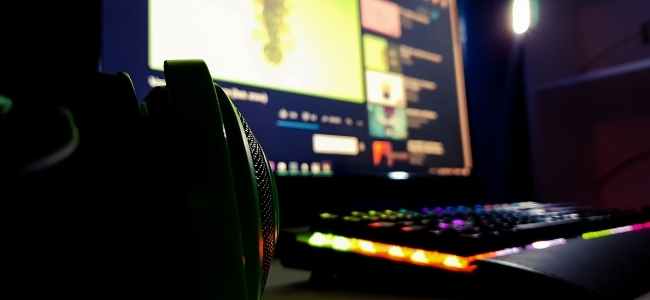PC gaming sure has come a long way in the 21st century with hundreds of millions of gamers worldwide. Something almost every PC gamer will be concerned about is whether their gaming PC is good enough to ensure an optimal gaming performance. With games becoming more demanding, it’s unavoidable that you will have to make improvements to your computer at some point. So let’s have a look at five ways you can improve gaming performance on your PC.
1. Graphics cards
Whether you’re working your way through a 5,000-word essay or enjoying the latest first-person shooter, your computer is utilising a graphics processing unit (GPU). A GPU can be part of the computer’s motherboard or processor, or can be a part of a powerful expansion card. Frequently referred to as a graphics card, this serves to perform much more powerful tasks on the computer.
While computers have a graphics card installed, it is possible to install a new one – at least for desktop. Having a better, more powerful graphics card will significantly improve a computer’s gaming ability. With games advancing at a very impressive rate, just like with all technology, it’s easy to be left behind. An outdated graphics card will be detrimental to a computer’s ability to play certain games, so it’s worth checking the requirements from a game to see if your graphics card is sufficient or if you should invest in a new one.
Graphics Drivers
In order to ensure that the most popular and powerful games run well on their hardware, manufacturers of graphics cards are constantly releasing new drivers. A graphics driver is the software that allows your operating systems and programs to use your graphics hardware. It is crucial for computers gaming to ensure they have the latest graphics driver. This will help optimise your graphics card performance.
Drivers are very easy to get hold of. They can usually be found on the manufacturer’s website and downloaded with a few short steps on the installation wizard. Make sure your driver remains up to date by allowing any auto-updates.
2. Add more RAM
Random access memory, or RAM, temporarily holds information that your computer needs to access. RAM ensures that your computer can perform everyday tasks, such as loading applications or internet browsing. But having enough RAM is crucial is having a good gaming experience. If your computer has low RAM, it won’t be able to store the information that a game needs to run properly.
RAM capacity is measured in gigabytes (GB). A higher capacity will mean that applications can be more data in it. Like graphics cards, a game will usually provide you with the information needed to decide how much RAM you need. The majority of modern day games require a minimum of 12GB, but having 16GB is also wise to futureproof your computer’s performance ahead of future releases.
It’s a lot easier, and cheaper, to add more RAM to a desktop computer as it has much more physical space. Most people with a basic understanding of a desktop tower’s interior are capable of installing more RAM with relative ease. However, if you’re not familiar it’s worth getting someone with a more working knowledge to do it for you so you don’t make a mistake that could compromise your computer system.
3. Add a solid-state drive
Solid-state drives (SSDs) have begun to replace more traditional hard disk drives (HDDs), which have been around longer. This is, in part, because SSDs have become a lot more affordable in recent years, but they are also significantly quicker.
Computer games have a lot of data that they have to process, such as loading levels or animations. An SSD helps games to load and run much faster. As a result of this, gamers will typically experience less stutter, which can give you a significant advantage over your opponents.
There are many SSDs out there so it’s worth going down the rabbit hole of reviews to see which is the right one for you. Be careful, though: you must make sure that the SSD you chose is compatible with your operating system.
4. Run computer optimisation software
Running computer optimisation software will give your gaming performance a noticeable boost. When you install more and more programs onto your computer, there’s bound to be a dip in performance as a lot of programs run in the background even if they’re not being used. This means that your computer is using its processing power elsewhere while it could be powering up your game.
There are a lot of computer optimisation programs out there that will flag up programs you rarely use. This gives you the option to either uninstall these programs or simply disable its ability to run in the background.
With this approach you have to proceed with caution – just because you are not using a program regularly it doesn’t mean that it’s not useful. Make sure you closely survey which programs are installed before deleting to improve computer performance.
5. Optimise game settings
It’s very tempting for a gamer to set all of their in-game settings to the max, but doing this will adversely affect your computer’s ability to process the game. You may find you have a preference between performance or quality. There are programs out there that make it easy to alternate between the two. Most of the multiplayer games are now offering Elo boosting services to their players to boost their ranks.
If it’s performance that you are looking for then it may be worth turning down your game’s resolution. While the graphics may not be as impressive, they’ll still be good and you’ll notice an uptick in performance.
It is important to strike a balance, however. You don’t want to lower your game’s resolution so much that it ruins your overall experience. It may take a little bit of trial and error before you achieve the balance that you are most comfortable with.
Summary
It’s something you will have to deal with at some point if you haven’t already. Luckily the issue isn’t as big as it may seem and there are a number of approaches you can take to improve your PC’s gaming performance.
Whether it’s adding more RAM, or running computer optimisation software, or perhaps a combination of all of the above points, improving performance can also simply come down to budget. It’s worth noting how much you have to spend before embarking on your quest to improve gaming performance on your PC.

